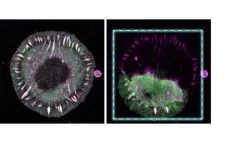(Press-News.org) Key Takeaways
In breast cancer, nearby lymph nodes, which are part of the immune system, are usually the first site of cancer spread
New research led by investigators at Massachusetts General Hospital (MGH) reveals how cancer cells suppress anti-cancer immune responses in the lymph nodes to survive and spread, or metastasize
The findings could lead to new strategies to prevent this suppression and unleash the immune system to fight cancer
BOSTON – In breast cancer, nearby lymph nodes, which are part of the immune system, are usually the first site of cancer spread, and from here cancer cells can travel to other parts of the body, such as the brain, lung, liver, and bones.
New research led by investigators at Massachusetts General Hospital (MGH) reveals how cancer cells suppress anti-cancer immune responses in the lymph nodes to survive and spread, or metastasize.
The findings, which are published in the Journal of Experimental Medicine, could lead to new strategies on how to prevent this suppression and unleash the immune system to fight cancer.
In a breast cancer mouse model, the scientists analyzed and compared the gene expression patterns of individual cancer cells that were residing within breast tissue or had metastasized to lymph nodes.
They also studied how immune cells acted in the presence of these cancer cells.
Finally, the team examined published data on gene expression patterns in human breast cancer cells during lymph node metastasis.
These efforts revealed that some breast cancer cells in the lymph nodes of mice and humans exhibit elevated expression of genes that code for MHC class II (MHC-II) proteins, which when present on the cell surface of antigen presenting cells are involved in initiating immune responses.
However, the MHC-II+ cancer cells lacked what are called co-stimulatory molecules typically present on antigen presenting cells that alert immune cells of danger.
As a result, the lymph nodes had higher numbers of tolerant immune cells and fewer activated immune cells.
Knocking out the gene for MHC-II in cancer cells reduced lymph node metastasis and the expansion of tolerant immune cells in mice, leading to prolonged animal survival.
On the other hand, overexpression of a protein that increases MHC-II expression worsened lymph node metastasis and caused excessive expansion of tolerant immune cells.
“Our findings have significant implications for developing effective treatments to target lymph node metastases, prevent cancer spread to other organs, and restore anti-tumor immunity in the tumor-draining lymph nodes,” says co–lead author Pin-Ji Lei, PhD, a postdoctoral research fellow in Radiation Oncology at MGH.
Co–senior author Timothy P. Padera, PhD, the 2021–2026 Rullo Family MGH Research Scholar and an associate professor of Radiation Oncology at Harvard Medical School, notes that additional research is needed to fully determine the clinical significance of the group’s findings.
“We need to see if cancer cell reprogramming by the lymph node microenvironment affects patients’ anti-cancer immune response."
Additional co-authors include Ethel R. Pereira, Patrik Andersson, Zohreh Amoozgar, Jan Willem Van Wijnbergen, Meghan J. O’Melia, Hengbo Zhou, Sampurna Chatterjee, William W. Ho, Jessica M. Posada, Ashwin S. Kumar, Satoru Morita, Lutz Menzel, Charlie Chung, Ilgin Ergin, Dennis Jones, Peigen Huang, and Semir Beyaz.
This work was supported by grants from the National Institutes of Health; the Rullo Family MGH Research Scholar Award; the Oliver S. and Jennie R. Donaldson Charitable Trust; the Harold and Leila Y. Mathers Charitable Foundation; the Mark Foundation for Cancer Research; the Chan Zuckerberg Initiative/Silicon Valley Community Foundation; the STARR Cancer Consortium; the CSHL and Northwell Health Affiliation; the New York Genome Center Polyethnic-1000 Initiative; the Walter Benjamin Programme; the German Research Foundation; the Agency for Science, Technology and Research; the METAvivor Foundation; the American Association for Cancer Research/Breast Cancer Research Foundation; and the Karin Grunebaum Cancer Research Foundation.
About the Massachusetts General Hospital
Massachusetts General Hospital, founded in 1811, is the original and largest teaching hospital of Harvard Medical School. The Mass General Research Institute conducts the largest hospital-based research program in the nation, with annual research operations of more than $1 billion and comprises more than 9,500 researchers working across more than 30 institutes, centers and departments. In July 2022, Mass General was named #8 in the U.S. News & World Report list of "America’s Best Hospitals." MGH is a founding member of the Mass General Brigham healthcare system.
END
Study sheds light on how breast cancer cells evade immune surveillance and survive in lymph nodes
New research led by investigators at Massachusetts General Hospital (MGH) reveals how cancer cells suppress anti-cancer immune responses in the lymph nodes to survive and spread, or metastasize
2023-06-21
ELSE PRESS RELEASES FROM THIS DATE:
Targeting GITR in cancer immunotherapy – there is no perfect knowledge
2023-06-21
“[...] the experience with GITR targeting in patients may inform the development of either novel or next-generation immunotherapy approaches.”
BUFFALO, NY- June 21, 2023 – A new research perspective was published in Oncotarget's Volume 14 on June 19, 2023, entitled, “Targeting GITR in cancer immunotherapy – there is no perfect knowledge.”
In this new perspective, researchers Diwakar Davar and Roberta Zappasodi from the University of Pittsburgh Medical Center (UPMC), University of Pittsburgh, Weill Cornell Medical College, and Weill Cornell Graduate School ...
Demonstrating the significance of individual molecules during mechanical stress in cells
2023-06-21
The cells in our body are continuously exposed to mechanical forces that are either externally applied or generated by the cells themselves. Being able to respond to such mechanical stimuli is an indispensable prerequisite for a large number of biological processes. However, how cells manage to process mechanical stimuli is poorly understood because techniques to study the very fine mechanical signals in cells are lacking. Researchers at the University of Münster (Germany) have now developed a method for altering the mechanics ...
Laser therapy is most effective treatment for tinnitus, study finds
2023-06-21
Low-level laser therapy and associated photobiomodulation is the most effective of the known treatments for tinnitus, according to a study comparing the main therapies in current use, conducted by Brazilian scientists affiliated with the Optics and Photonics Research Center (CEPOF). The study is reported in an article published in the Journal of Personalized Medicine.
CEPOF is a Research, Innovation and Dissemination Center (RIDC) funded by FAPESP and hosted at the University of São Paulo’s São Carlos Institute of Physics (IFSC-USP) in Brazil.
Some 750 million people suffer from tinnitus worldwide, according to a European study that analyzed five ...
'All-inside' meniscal repair shows good long-term outcomes
2023-06-21
June 21, 2023 – A second-generation "all-inside" meniscal repair system provides a high success rate at long-term follow-up, reports a study in The Journal of Bone & Joint Surgery. The journal is published in the Lippincott portfolio in partnership with Wolters Kluwer.
"Our 10-year results of second-generation, all-inside repair were better than those of first-generation implants and equivalent to those seen with the other common techniques," according to the new research, led by Rick W. Wright, MD, of Vanderbilt University Medical Center, Nashville.
Long-term ...
Rotman School professor receives Sumantra Ghoshal Award for Rigour and Relevance in the Study of Management
2023-06-21
Toronto – Anita M. McGahan, a professor at the University of Toronto’s Rotman School of Management, is the 2023 recipient of the Sumantra Ghoshal Award for Rigour and Relevance in the Study of Management.
The Ghoshal Award recognizes a scholar who has distinguished themself by demonstrating both rigorous and impactful scholarship, and by engaging with the world of practice. The award is presented annually in the memory of Ghoshal, who was a professor at London Business School and whose research focused on ...
Tranexamic acid may lower heterotopic ossification risk after elbow trauma surgery
2023-06-21
June 21, 2023 – For patients undergoing surgery for elbow trauma, treatment with the hemostatic drug tranexamic acid (TXA) is associated with a decreased incidence of heterotopic ossification (HO) – a common complication of abnormal bone formation, reports a study in The Journal of Bone & Joint Surgery. The journal is published in the Lippincott portfolio in partnership with Wolters Kluwer.
The findings "add new clinical evidence regarding the protective role of TXA with respect to the prevention of HO after elbow trauma," according to the report by Cunyi ...
Wearable monitor detects stress hormone levels across a full 24-hour day
2023-06-21
Early warning signs of diseases caused by dysfunctional levels of stress hormones could be spotted more easily thanks to a new wearable device developed by endocrine researchers.
This is the first time it has been possible to measure changes to people’s stress hormones as they go about normal daily activities, across both day and night. The new collaborative research led by the University of Bristol, University of Birmingham and University of Bergen has the potential to revolutionise how diseases of the stress hormone system are diagnosed and treated.
The technology, ...
Monarchs’ white spots aid migration
2023-06-21
If you’ve ever wondered how the monarch butterfly got its spots, University of Georgia researchers may have just found the answer.
The new study suggests that the butterflies with more white spots are more successful at reaching their long-distance wintering destination. Although it’s not yet clear how the spots aid the species’ migration, it’s possible that the spots change airflow patterns around their wings.
“We undertook this project to learn how such a small animal can make such a successful ...
Wild and feral cats shed more toxoplasmosis parasites in areas densely populated by humans
2023-06-21
A new analysis suggests that wild, stray, and feral cats living in areas with higher human population density tend to release—or “shed”—a greater amount of the parasite that causes the disease toxoplasmosis. The study also draws links between environmental temperature variation and parasite shedding. Sophie Zhu of the University of California Davis, U.S., and colleagues present these findings in the open-access journal PLOS ONE on June 21.
Toxoplasmosis is a mild-to-severe disease caused by Toxoplasma gondii, which can infect warm-blooded vertebrates, including humans and many wild or domestic animals; for instance, cats, sheep, mice, birds, ...
Young people learn gradually to reflect on mental states, peaking in young adulthood
2023-06-21
The capability to reflect on their own mental state and that of others continues to develop throughout adolescence, with mentalizing scores varying by gender and personality traits, according to a new study published this week in the open-access journal PLOS ONE by Alex Desatnik of University College London, UK, and colleagues.
It has been established that the human brain undergoes a number of important changes during adolescence, especially in the “social brain” regions associated with social cognition. One of the key constructs capturing multiple facets of social cognition is ...
LAST 30 PRESS RELEASES:
Public and patient involvement in research is a balancing act of power
Scientists discover “bacterial constipation,” a new disease caused by gut-drying bacteria
DGIST identifies “magic blueprint” for converting carbon dioxide into resources through atom-level catalyst design
COVID-19 vaccination during pregnancy may help prevent preeclampsia
Menopausal hormone therapy not linked to increased risk of death
Chronic shortage of family doctors in England, reveals BMJ analysis
Booster jabs reduce the risks of COVID-19 deaths, study finds
Screening increases survival rate for stage IV breast cancer by 60%
ACC announces inaugural fellow for the Thad and Gerry Waites Rural Cardiovascular Research Fellowship
University of Oklahoma researchers develop durable hybrid materials for faster radiation detection
Medicaid disenrollment spikes at age 19, study finds
Turning agricultural waste into advanced materials: Review highlights how torrefaction could power a sustainable carbon future
New study warns emerging pollutants in livestock and aquaculture waste may threaten ecosystems and public health
Integrated rice–aquatic farming systems may hold the key to smarter nitrogen use and lower agricultural emissions
Hope for global banana farming in genetic discovery
Mirror image pheromones help beetles swipe right
Prenatal lead exposure related to worse cognitive function in adults
Research alert: Understanding substance use across the full spectrum of sexual identity
Pekingese, Shih Tzu and Staffordshire Bull Terrier among twelve dog breeds at risk of serious breathing condition
Selected dog breeds with most breathing trouble identified in new study
Interplay of class and gender may influence social judgments differently between cultures
Pollen counts can be predicted by machine learning models using meteorological data with more than 80% accuracy even a week ahead, for both grass and birch tree pollen, which could be key in effective
Rewriting our understanding of early hominin dispersal to Eurasia
Rising simultaneous wildfire risk compromises international firefighting efforts
Honey bee "dance floors" can be accurately located with a new method, mapping where in the hive forager bees perform waggle dances to signal the location of pollen and nectar for their nestmates
Exercise and nutritional drinks can reduce the need for care in dementia
Michelson Medical Research Foundation awards $750,000 to rising immunology leaders
SfN announces Early Career Policy Ambassadors Class of 2026
Spiritual practices strongly associated with reduced risk for hazardous alcohol and drug use
Novel vaccine protects against C. diff disease and recurrence
[Press-News.org] Study sheds light on how breast cancer cells evade immune surveillance and survive in lymph nodesNew research led by investigators at Massachusetts General Hospital (MGH) reveals how cancer cells suppress anti-cancer immune responses in the lymph nodes to survive and spread, or metastasize




